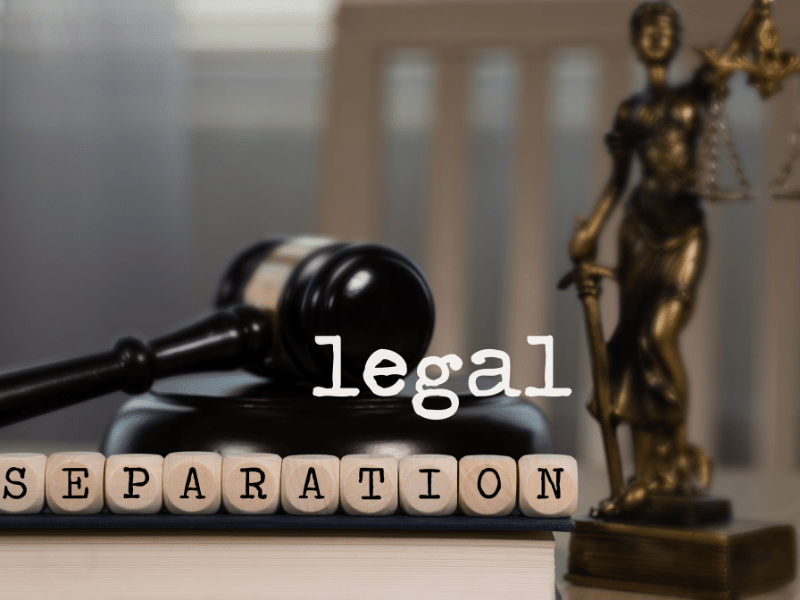
When many people think of ending a marriage, the first thing that comes to mind is divorce. However, there are actually three different ways to legally end a marriage – divorce, legal separation, and annulment. Each option has its own set of benefits and drawbacks, and in this article we will provide you the complete comparison between annulment vs divorce vs legal separation. It's important to understand all three before making a decision about what's right for you.
What is an annulment?

An annulment is a legal process that can be used to end a marriage. Unlike a divorce, which dissolves a marriage that has already taken place, an annulment declares that the marriage never happened in the first place. This can be a useful option if you believe that your marriage was not valid from the beginning. For example, you may be able to get an annulment if you were forced into marriage or if one of the spouses was not actually able to consent to the marriage.
Annulment Vs. Divorce: Actual Differences Explained
1. Annulment is a legal process that declares a marriage null and void. Divorce is the dissolution of a valid marriage.
2. Annulment is typically faster and less expensive than divorce. Divorce can be lengthy and expensive, especially if there are contested issues involved.
3. In most cases, an annulment restores both parties to single status. Divorce leaves both parties with the status of the divorce.
4. An annulment is usually granted on the basis of fraud, duress, or misrepresentation. A divorce is usually granted on the grounds of irreconcilable differences.
5. An annulment voids a marriage from its inception and is as if the marriage never happened. A divorce ends a valid marriage.
6. In some cases, an annulment may be the only option for dissolving a marriage. In other cases, divorce may be the only option.
7. If you are considering an annulment, it is important to consult with an experienced attorney to determine if you meet the requirements for an annulment in your state. If you are considering a divorce, it is also important to consult with Get Divorce Papers to determine the best course of action for your particular situation.
What are the benefits of an annulment vs. divorce?
1. Annulments are often quicker and simpler to obtain than divorces.
2. Annulments are typically less expensive than divorces.
3. In many cases, annulments do not involve as much paperwork or court appearances as divorces do.
4. An annulment can be a more emotionally satisfying option for some couples than a divorce.
5. Annulments can be easier to obtain if you have been married for a shorter period of time.
6. If you or your spouse is Catholic, an annulment may be necessary in order to remarry in the Church.
7. Annulments can be granted for a variety of reasons, including fraud, bigamy, and coercion.
8. Once an annulment is granted, it is as if the marriage never took place.
9. You may need to obtain an annulment if you want to remarry in another country.
10. If you have children, your annulment may be more complex than if you do not have children.
Drawbacks of filing annulment vs. divorce
- Annulments are more difficult to obtain than divorces
In most cases, annulments are more difficult to obtain than divorces. This is because an annulment declares that a marriage was never valid in the first place, while a divorce simply dissolves a marriage that has already been declared valid. There are a few grounds for obtaining an annulment, such as one spouse being underage at the time of marriage or one spouse being unable to consummate the marriage. In order to obtain an annulment, you will need to prove that there was never a valid marriage in the first place. This can be difficult to do, especially if you have been married for a long time. If you are considering an annulment,
- Annulments may be denied if the couple has been married for a short time or if there are no reasonable grounds to annul the marriage
If you have been married for a short time, or if there are no reasonable grounds to annul the marriage, your annulment may be denied. This is because the court may not believe that there was never a valid marriage in the first place. In order to obtain an annulment, you will need to provide evidence that proves that the marriage was never valid. This can be difficult to do, especially if you have been married for a long time. If you are considering an annulment, it is important to speak with an experienced company who can help you navigate the legal process.
- If an annulment is granted, it is as if the marriage never occurred; this means that both parties are free to marry again
An annulment is a legal declaration that a marriage was never valid. If an annulment is granted, it is as if the marriage never occurred. This means that both parties are free to marry again.
When is it appropriate to pursue an annulment?
There are a few grounds for obtaining an annulment, such as one spouse being underage at the time of marriage or one spouse being unable to consummate the marriage. If you meet any of these grounds, you may be eligible to pursue an annulment. If you are considering an annulment, it is important to speak with an experienced attorney who can help you navigate the legal process.
How does an Annulment work
In order to get the marriage annulment, you will have to follow the following steps
- Check the eligibility requirements for annulment in your state.
In order to get an annulment in most states, you must show that the marriage was invalid from the beginning. This could be due to factors such as one spouse being underage, one spouse being already married, or one spouse not being able to consent to the marriage due to mental illness. There are other reasons a marriage may be considered invalid, so it's important to check the specific requirements for your state.
- File a petition for annulment with the court.
In order to start the annulment process, you will need to file a petition with the court in the county where you got married or where either spouse currently lives. You will likely need to pay a filing fee when you submit your petition.
- Serve your spouse with the petition for annulment.
Once you have filed your petition, you will need to serve your spouse with the legal paperwork. This can be done by hiring a professional process server or by asking the court to allow you to serve the papers by certified mail.
- Attend the hearing on your annulment.
Once you have served your spouse with the petition, the court will set a hearing date. At the hearing, both spouses will have an opportunity to present evidence and argue their case. The judge will then make a decision on whether or not to grant the annulment.
- Follow the court's decision.
If the court grants the annulment, you will be legally unmarried and will be able to marry again. If the court denies the annulment, you will remain married and will not be able to remarry unless you obtain a divorce.
What is a divorce?

Divorce is a legal process that ends a marriage. A couple may choose to divorce for many reasons, such as disagreements about money, infidelity, or different interests. No matter the reason, divorce can be emotionally and financially difficult for both spouses.
There are a few grounds for divorce, such as adultery, abandonment, or cruelty. If you meet any of these grounds, you may be eligible to file for divorce. If you are considering a divorce, it is important to speak with an experienced attorney who can help you navigate the legal process.
What are the benefits of divorce vs. annulment or legal separation?
- With a divorce, you are no longer legally married. This means that you are free to remarry if you choose.
When you get divorced, you are no longer legally married. This means that you are free to remarry if you choose. It's a big decision, and it's important to think about what you want for your future before making a move. If you do decide to remarry, make sure that you are ready for a new relationship and that you are doing it for the right reasons.
- A divorce allows each spouse to divide up assets and debts according to their own wishes. This is not the case with an annulment or legal separation.
When you get divorced, you and your spouse are able to divide up assets and debts however you wish. This is not the case with an annulment or legal separation. During a divorce, each spouse can negotiate what they want to keep and what they want to give up. This can be a difficult process, but it's important to remember that you are both entitled to fair treatment. If you can't agree on something, the court will make a decision for you.
- After a divorce, you are no longer next of kin to your former spouse. This means that you are not legally obligated to take care of them if they become sick or injured.
- If you have children, a divorce will provide them with stability and certainty as they grow up. An annulment or legal separation could result in confusion and instability for the children.
- A divorce can be finalized relatively quickly, while an annulment can take many months (or even years) to complete.
When it comes to finalizing a divorce, there's one big difference between it and an annulment: how quickly it can happen. A divorce can be finalized relatively quickly, often in just a few months. An annulment, on the other hand, can take many months (or even years) to complete. This is because an annulment is a more thorough process, and the court wants to make sure that all of the necessary paperwork is filed correctly.
- A divorce is usually less expensive than an annulment, especially if the couple has been married for a long time.
When it comes to the cost of getting a divorce or an annulment, there is a big difference between the two. A divorce is usually much less expensive than an annulment, especially if the couple has been married for a long time. This is because a divorce is a simpler process, and there are fewer court costs involved.
- After a divorce, you will still have some ties to your ex-spouse (e.g., through children, shared property, or joint debt), but these ties are typically much weaker than those in a marriage.
After a divorce, you will still have some ties to your ex-spouse. This might include shared property, joint debt, or children together. However, these ties are typically much weaker than those in a marriage. This is because a divorce is a more formal separation, and the court wants to make sure that all ties between the couple are severed. This can be difficult for both parties, but it's important to remember that you are no longer legally married.
If you're considering getting divorced, it's important to weigh all of your options and make the decision that's best for you and your family.
Drawbacks of filing annulment vs. divorce
1. A divorce is a public declaration that a marriage has failed. An annulment is a secret proceeding in most cases.
2. Divorce can be expensive and may involve hiring attorneys and paying court fees. Annulments are usually less expensive than divorces, and legal separations are the least expensive of all three options.
3. Spouses who get divorced lose the automatic right to inherit from one another if they die without a will. Annulled couples and those who are legally separated still have this right.
4. During a divorce, both spouses must disclose all their assets and debts to each other, while this is not always required in an annulment or legal separation proceeding.
5. If you get divorced, your spouse may be able to claim a portion of your Social Security benefits when you retire. This is not true for those who have had an annulment or are legally separated."
When is it appropriate to pursue a divorce?
There are a number of situations in which it may be appropriate to pursue a divorce. One of the most common is when the couple has irreconcilable differences and cannot continue to live together. Other situations that may lead to a divorce include domestic violence, adultery, or addiction.
If you feel like you can't continue to live with your spouse, it's important to speak to an attorney about your options. You may be able to get a divorce without going to court, but if there are disagreements between the two parties, the case may end up in front of a judge. It's important to remember that divorces can be messy and emotional, so it's often best to have an experienced professional on your side.
How does a divorce work
The process of divorce can be complex and challenging, but it is important to understand all of the steps involved. If you are considering a divorce, or have already decided to proceed with one, here are the key steps you will need to take:
- Gather information about divorce
Before beginning the process, it is important to have a clear understanding of what divorce entails. This means being familiar with the grounds for divorce in your state, as well as any specific requirements that may apply in your case. You should also be aware of the potential financial implications of divorce, including alimony and child support payments.
- Talk to a lawyer
Once you have a general understanding of the divorce process, it is time to consult with a lawyer. This is an important step, as your lawyer will be able to provide you with specific advice about your case. He or she can also help you understand the potential consequences of divorce, both legal and financial.
- File for divorce
Once you have decided to proceed with the divorce, you will need to file a petition with the court. This document will request that the court grant you a divorce and can also include other requests, such as child custody or alimony.
- Serve divorce papers
After you have filed your petition, you will need to serve it on your spouse. This can be done in person, by mail, or through a process server. Once your spouse has been served, he or she will have a certain amount of time to respond to the petition.
- Respond to the divorce petition
Once your spouse has received the divorce papers, he or she will have the opportunity to file a response. This document can either agree with the requests made in your petition, or it can challenge them. If your spouse does not respond to the petition, you may still be able to proceed with the divorce.
- Negotiate a settlement agreement
In many cases, spouses are able to reach an agreement on the terms of their divorce without going to trial. This agreement will typically be memorialized in a written document known as a settlement agreement.
- Finalize the divorce
Once you have reached an agreement with your spouse, or if your spouse does not respond to the divorce petition, you will need to file a motion with the court to have the divorce finalized. This motion will typically be granted, and the divorce will be official.
What is a legal separation?

A legal separation is a court order that separates you and your spouse from each other. You will no longer be considered married, but you will still be legally responsible for each other. This means that you will have to continue to share income and property, and you will still be responsible for each other's debts.
Legal Separation Vs. Divorce: Actual Differences
- Legal separation is a court-ordered process that ends the marriage, while the divorce is the end of a marriage that is granted by a court
- In a legal separation, the couple may live in different residences, while in a divorce, the couple must live separately
- A legal separation can be revoked at any time, while a divorce cannot be undone
- Child custody, visitation, and support are typically worked out in a legal separation just as they would be in a divorce
- Alimony may also be ordered in a legal separation
- A divorce will end the couple's marital status while a legal separation will maintain it
- A divorce decree can only be issued by a court, while a legal separation agreement is a contract between the couple
- A divorce generally takes longer to finalize than a legal separation
- A divorce may be more expensive than a legal separation because of the court fees associated with it
- A divorce may have negative psychological effects on children, while a legal separation typically does not
- A divorce may be granted for grounds such as adultery or abandonment, while a legal separation is typically granted for religious reasons or if the couple wants to remain married but live apart
- A divorce will end the couple's health insurance, while a legal separation typically will not
- A divorce may have tax implications, while a legal separation typically will not
- When a couple divorces, they are no longer considered married by the government, while a legal separation does not change the couple's marital status
- After a divorce, the couple is free to remarry, while in a legal separation, the couple is still considered married.
What are the benefits of a legal separation vs. divorce?
1. You remain legally married, which can have benefits for things like Social Security and insurance.
2. You don't have to divide your property or debts.
3. You can still receive spousal support from your spouse.
4. It can be a less expensive option than divorce.
5. You can still get divorced if you change your mind later on.
Drawbacks of filing legal separation vs. divorce
- Legal separation can be a precursor to divorce
Legal separation can be a precursor to divorce. If you and your spouse are considering divorce but aren't sure if you're ready to make the final leap, a legal separation may be a good option for you. A legal separation will give you some of the same benefits as a divorce – such as the ability to live separately and the division of property and debts – without actually ending your marriage. This can be a good way to test the waters and see if divorce is really right for you. If it turns out that you are happier living apart than you were married, you can always file for divorce later on.
- If you file for legal separation and then change your mind, you may have to file for divorce anyway
If you file for legal separation and then change your mind, you may have to file for divorce anyway. If you are no longer getting along with your spouse and you are unable to communicate, then legal separation may be the precursor to divorce. However, if you decide that you want to try and save your marriage, you may be able to work out your differences and stay married. It is important to consult with an attorney to determine what is best for you and your particular situation.
- Legal separation doesn't end your marriage, whereas divorce does
- If you have children, a legal separation may not be the best option for them
If you have children, a legal separation may not be the best option for them. This is because, during a legal separation, the couple is still legally married. This can be confusing for children, and it may not be the best option for them. If you are no longer getting along with your spouse and you are unable to communicate, then divorce may be a better option for you and your children. It is important to consult with an attorney to determine what is best for you and your particular situation.
- It can be expensive to file for legal separation
Legal separation can be an expensive process. This is because you will need to hire an attorney to help you through the process. Additionally, you will need to file for legal separation in court, which can also be costly.
- You may have to go through the same process as a divorce if you later decide to divorce
If you decide that you want to end your marriage, you may have to go through the same process like divorce. This means that you will need to file for legal separation in court and hire an attorney to help you through the process. It is important to consult with an attorney to determine what is best for you and your particular situation.
When is it appropriate to pursue a legal separation?
A legal separation is usually appropriate when you and your spouse are not ready to divorce but you need to live apart for personal or financial reasons. It can also be a good option if you are not sure if you want to get divorced but you want to take some time to figure things out.
How does a legal separation work
In order to get the legal separation, you will have to follow the following steps.
File a petition with the court
order to file for legal separation; you will need to file a petition with the court. This document will outline your reasons for wanting separation and lay out the agreements you have reached with your spouse about custody, support, and property division. If you and your spouse are in agreement about all of these issues, the court will usually
Reach an agreement with your spouse
If you and your spouse are in agreement about all of the issues involved in a legal separation, the court will usually approve your agreement without any problems. However, if there are any disputes or disagreements, the court will hold a hearing to decide these issues. In most cases, the court will order that both parties attend mediation in order to try to reach an agreement before the hearing. If you are able to reach an agreement, the court will issue a separate order that will put your agreement into effect.
Attend mediation
If you and your spouse are unable to agree on all of the issues involved in your legal separation, the court may order that both parties attend mediation in order to try to reach an agreement. Mediation is a process where both parties meet with a neutral third party to discuss their disagreement and try to come to an agreement. If you are able to reach an agreement through mediation, the court will issue a separate order that will put your agreement into effect.
The court issues a separation order.
Once you have reached an agreement with your spouse about how you will handle things like child custody, visitation, spousal support, and property division, the court will issue a separation order. This document will outline the terms of your agreement and put it into effect. It is important to note that a legal separation is not the same as a divorce, and you will still be technically married after the separation. However, a legal separation can give you many of the same rights and protections as divorce, such as the ability to file for child support or spousal support.
Choosing the right option for you
When it comes to choosing between an annulment, divorce, and legal separation, it is important to understand the differences between each option. Annulment is a process by which a marriage is declared invalid, while divorce dissolves a marriage that has already taken place. Legal separation allows couples to live separately while still remaining married.
Which option is right for you will depend on your individual circumstances. If you have irreconcilable differences with your spouse and cannot continue to live together, divorce may be the best option. If you are experiencing domestic violence or addiction, a legal separation may be a better choice.
It is important to speak with GetDivorcePapers.com about your options and get advice specific to your case.









